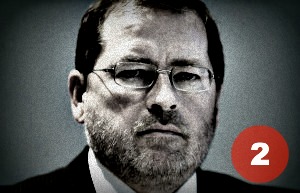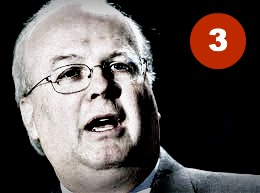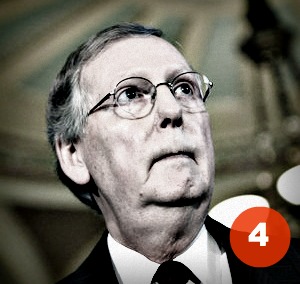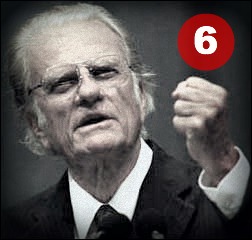Bobby Jindal, the Republican Governor of Louisiana, when asked a few days ago to reflect on the election, said, “We cannot be, we must not be, the party that simply protects the rich so they get to keep their toys.” Sure, he’s probably lying, but I still think it’s safe to say that this comment, coming as it does, after last week’s election, reflects a tectonic shift that’s beginning to take place within conservative politics. Rocked to their very core by what took place last Tuesday, those Republicans who have somehow managed to remain in power, are desperately looking for something to cling to. Last Tuesday, they were shown, in epic fashion, not only that, due to the rapidly shifting demographics of America, they could no longer count on angry, old, white males to deliver election victories, but that the bulwarks that they’d put in place to hold off this eventuality, weren’t going to stand up to the pressure. Neither their aggressive voter suppression efforts, nor their well-funded and deceitful ad campaigns made possible by the Supreme Court’s Citizens United decision, were going to keep back the surging tides of change. And, now, they’re scrambling to redefine themselves in such a way that doesn’t make a majority of Americans, who apparently aren’t so receptive to a platform built on race-baiting, rape and the end of social security, want to vomit.
Deep down inside, I think the Republicans know what needs to be done if they want to keep from becoming a fringe party. They know that they need to take a scalpel to the heart of their party, and remove the cancer. It’ll be painful, but they know that they need to dig out the theocratic, xenophobic, anti-government and racist elements which have served them so well since Reagan’s ascendency in 1980. But, the problem is, they don’t know how to extricate themselves. (I want to use the analogy of the morbidly obese woman who became fused to her couch, but I think it might be in bad taste.) So, while they try to figure that out, they’re beginning to nibble around the edges in little ways, and test the waters outside of the area marked off as politically “safe” by the Tea Party. For example, the day after the election, we heard Republican Speaker of the House John Boehner, in a complete reversal, say that Republicans need to help pass comprehensive immigration reform, which includes a path to citizenship for current undocumented workers. And, even more shocking, we started hearing conservative stalwarts, like Bill Kristol, suggesting that maybe Republicans should give up the fight to extend the Bush tax cuts, allowing them to expire on December 31.
Clearly, there’s one thing these men hate more than taxes on the wealthy and the thought of undocumented workers voting, and that’s the prospect of losing what little power they have left. And, because of that, it looks as though we might actually start to see some legislative progress made in Washington, after four years of unprecedented obstructionism. And, at the same time, we’ll likely also see scapegoats being sacrificed as the reformation of the party slowly moves forward… Here, with that in mind, are my thoughts on some of the individuals who aren’t likely to recover.
 Shelden Adelstein: Casino magnate Sheldon Adelson and his wife, Miriam Ochsorn, funneled more than $53 million of their money into Super PACs backing Romney, GOP primary hopeful Newt Gingrich, and other Republicans this last election cycle. Had Romney won, it’s been said that Adelson, who is worth over $20.5 billion, would have done quite well on his investment. It’s estimated that Adelson would have received a $2 billion tax cut under the Romney/Ryan plan. More importantly, though, many think that Adelson was backing Romney in order to stay out of prison. According to ABC News, “Adelson’s company has been the subject of a criminal investigation for the last year by the Department of Justice and the Securities Exchange Commission for alleged bribery of foreign officials.” (Adelson, according to a lawsuit filed by a former employee, may also have engaged with Chinese organized crime groups to open his Sands casino in Macau.) So it looks as though he gambled on a Romney administration that would be more sympathetic to his situation, and he lost. And not only did he lose on Romney – he also placed losing bets on Connie Mack, Richard Mourdock, Josh Mandel, George Allen, Shmuley Boteach, and Allen West. Out of all of his investments, only one paid off. Dean Heller won his Nevada Senate race against Shelley Berkley… While $53 million may be a drop in the bucket to Adleson, who is the 12th richest man in America, I’m happy to see him defeated in his attempt to subvert democracy by inundating the public airwaves with deceptive ads, and hope that he soon finds himself on trial for racketeering. More importantly, though, I hope that his experience is noted by other billionaires, and that, in the future, they’re less likely to engage in such anti-democratic activities.
Shelden Adelstein: Casino magnate Sheldon Adelson and his wife, Miriam Ochsorn, funneled more than $53 million of their money into Super PACs backing Romney, GOP primary hopeful Newt Gingrich, and other Republicans this last election cycle. Had Romney won, it’s been said that Adelson, who is worth over $20.5 billion, would have done quite well on his investment. It’s estimated that Adelson would have received a $2 billion tax cut under the Romney/Ryan plan. More importantly, though, many think that Adelson was backing Romney in order to stay out of prison. According to ABC News, “Adelson’s company has been the subject of a criminal investigation for the last year by the Department of Justice and the Securities Exchange Commission for alleged bribery of foreign officials.” (Adelson, according to a lawsuit filed by a former employee, may also have engaged with Chinese organized crime groups to open his Sands casino in Macau.) So it looks as though he gambled on a Romney administration that would be more sympathetic to his situation, and he lost. And not only did he lose on Romney – he also placed losing bets on Connie Mack, Richard Mourdock, Josh Mandel, George Allen, Shmuley Boteach, and Allen West. Out of all of his investments, only one paid off. Dean Heller won his Nevada Senate race against Shelley Berkley… While $53 million may be a drop in the bucket to Adleson, who is the 12th richest man in America, I’m happy to see him defeated in his attempt to subvert democracy by inundating the public airwaves with deceptive ads, and hope that he soon finds himself on trial for racketeering. More importantly, though, I hope that his experience is noted by other billionaires, and that, in the future, they’re less likely to engage in such anti-democratic activities.
[note: While I'd like to say that unlimited spending on the part of billionaires like Adleson and the Koch Brothers didn't play a role in the election, it clearly did. PAC money not only helped Romney secure the nomination, but it, to a great extent, directed the national debate. It just so happens that, in these races, it wasn't enough to swing the election, either because the electorate saw through the bullshit, or because the Democratic ads, which were also well funded, by unions and private individuals, were more persuasive. This doesn't mean, however, that Citizens United is any less of a threat. Regardless of how things turned out this time, we cannot afford to let up on campaign finance reform, and we need to keep pushing to overturn the Citizens United decision by way of amendment... We might not be so lucky next time.]
 Grover Norquist: Anti-government Libertarian crusader Grover Norquist once famously stated that he’d like to shrink government “down to the size where we can drown it in the bathtub.” And, over the past few decades, he’s sought to do just that as the head of an organization called Americans for Tax Reform (ATR). In his position as Executive Director of ATR, Norquist has been an unstoppable force – coercing those seeking higher office to sign what he calls the “Taxpayer Protection Pledge,” or simply “The Pledge,” which is essentially a sworn oath not to raise taxes, regardless of circumstances. And it’s made him an incredibly powerful man. In the past Republican primary, if I’m not mistaken, every candidate signed Norquist’s pledge. In a feature on 60 Minutes this summer, Steve Kroft described Norquist, quite correctly, as being “responsible, more than anyone else, for rewriting the dogma of the Republican Party.” But, now, post November 6, it looks like he may end up on the ash heap of American history. It’s being reported today that few incoming members of the House and Senate, of either party, are signing the pledge. According to The Hill, “About a dozen newly elected House Republicans refused to sign the anti-tax pledge during their campaigns, and another handful of returning Republicans have disavowed their allegiance to the written commitment.” The article goes on to state, “With Democrats picking up seven or eight seats, that means the pledge guides fewer than the 218 members needed for a majority. In the Senate, where Republicans lost two seats, just 39 members of the chamber are pledge-signers, according to the group’s records. That is a drop from 238 members of the House and 41 senators who committed to the pledge at the start of the 112th Congress.” This would have been unheard of last year, but, again, it seems as though the times they are a changin’… Norquist, for what it’s worth, does not believe that people are turning away from his radical “starve the beast” agenda that would see Social Security privatized, The Environmental Protection Agency shuttered, and FEMA defunded, among other things. In an interview yesterday, he said that Obama defeated Romney not because people rejected his extreme Republican ideology, but because Obama portrayed Romney as a “poopy-head.” Meanwhile, not only are fewer members signing his pledge, but, from what I understand, the Republicans are polling their constituents to see just how forgiving they’d be if their elected officials who had signed the pledge, chose to violate it. It’s impossible to know, but it looks as though, very soon, Norquist may not be in a position to hold the American people hostage to his corporatist agenda.
Grover Norquist: Anti-government Libertarian crusader Grover Norquist once famously stated that he’d like to shrink government “down to the size where we can drown it in the bathtub.” And, over the past few decades, he’s sought to do just that as the head of an organization called Americans for Tax Reform (ATR). In his position as Executive Director of ATR, Norquist has been an unstoppable force – coercing those seeking higher office to sign what he calls the “Taxpayer Protection Pledge,” or simply “The Pledge,” which is essentially a sworn oath not to raise taxes, regardless of circumstances. And it’s made him an incredibly powerful man. In the past Republican primary, if I’m not mistaken, every candidate signed Norquist’s pledge. In a feature on 60 Minutes this summer, Steve Kroft described Norquist, quite correctly, as being “responsible, more than anyone else, for rewriting the dogma of the Republican Party.” But, now, post November 6, it looks like he may end up on the ash heap of American history. It’s being reported today that few incoming members of the House and Senate, of either party, are signing the pledge. According to The Hill, “About a dozen newly elected House Republicans refused to sign the anti-tax pledge during their campaigns, and another handful of returning Republicans have disavowed their allegiance to the written commitment.” The article goes on to state, “With Democrats picking up seven or eight seats, that means the pledge guides fewer than the 218 members needed for a majority. In the Senate, where Republicans lost two seats, just 39 members of the chamber are pledge-signers, according to the group’s records. That is a drop from 238 members of the House and 41 senators who committed to the pledge at the start of the 112th Congress.” This would have been unheard of last year, but, again, it seems as though the times they are a changin’… Norquist, for what it’s worth, does not believe that people are turning away from his radical “starve the beast” agenda that would see Social Security privatized, The Environmental Protection Agency shuttered, and FEMA defunded, among other things. In an interview yesterday, he said that Obama defeated Romney not because people rejected his extreme Republican ideology, but because Obama portrayed Romney as a “poopy-head.” Meanwhile, not only are fewer members signing his pledge, but, from what I understand, the Republicans are polling their constituents to see just how forgiving they’d be if their elected officials who had signed the pledge, chose to violate it. It’s impossible to know, but it looks as though, very soon, Norquist may not be in a position to hold the American people hostage to his corporatist agenda.
[note: I think it's probably worth noting that Norquist, despite his comment about wanting to drown the government in the bathtub, would, if given the chance, do no such thing. It's not government that he has an issue with. It's government by the people. What Norquist clearly wants is a legislature that's bought and paid for by corporate America that simply serves to enact legislation drafted in far-right think thanks, like ALEC. (Norquist, by the way, is intimately connected to ALEC.) Furthermore, I should add that this negative reaction to Norquist has been building for some time. In late 2011, Georgia Republican Senator Saxby Chambliss was quoted as saying, "Grover Norquist has no credibility, so I don’t respond to him. He doesn’t deserve being responded to." And, at around the same time, Virginia Republican Representative Frank Wolf had the following to say on the House floor. “Simply put, I believe Mr. Norquist is connected with and has profited from a number of unsavory people and groups out of the mainstream.”]
 Karl Rove: I hate Donald Trump, but he said something on election night that I liked. Right after he was done advocating violence, and calling for a “revolution,” Trump took to Twitter and said, “Congrats to @KarlRove on blowing $400 million this cycle. Every race @CrossroadsGPS ran ads in, the Republicans lost. What a waste of money.” As it’s rare that Trump gets his facts right on anything, I think it’s important to take a moment and acknowledge that, at least in this instance, he knew what he was talking about. Together, Rove’s SuperPAC, American Crossroads, and his 501(c)(4) “dark money” entity, Crossroads GPS, spent over $174 million this election cycle, and he has almost as little to show for it as Sheldon Adelstein. Just 1.29% of the $104 million spent by American Crossroads went toward backing winning candidates. (Crossroads GPS fared a bit better, with 14.4% of the $70 million spent going to winning candidates.) And, watching Rove on election night, as he freaked out and demanded that Fox News not call the election for Obama, you could tell that he knew what was unfolding. He knew that his moment was over, and that Crossroads was done. He knew at that moment that all of the wealthy conservatives who had opened their wallets for him, probably wouldn’t be accepting his calls in the future. And, to make matters worse, it’s being reported today that Rove may be in legal trouble for not having filed the appropriate registration for Crossroads GPS. And, with that, as they correctly point out at Salon, the “Myth of Rove,” has been shattered… Not only is he being laughed at on the Simpsons, but his own people are turning against him. According to a senior Republican consultant, “Crossroads was a failure and Rove’s core strategy of base-centric GOP politics is a failure… There are not enough white men for the Rove view to work any more. His time is past.” Hell, even Fox’s Megyn Kelly is talking back to him now.
Karl Rove: I hate Donald Trump, but he said something on election night that I liked. Right after he was done advocating violence, and calling for a “revolution,” Trump took to Twitter and said, “Congrats to @KarlRove on blowing $400 million this cycle. Every race @CrossroadsGPS ran ads in, the Republicans lost. What a waste of money.” As it’s rare that Trump gets his facts right on anything, I think it’s important to take a moment and acknowledge that, at least in this instance, he knew what he was talking about. Together, Rove’s SuperPAC, American Crossroads, and his 501(c)(4) “dark money” entity, Crossroads GPS, spent over $174 million this election cycle, and he has almost as little to show for it as Sheldon Adelstein. Just 1.29% of the $104 million spent by American Crossroads went toward backing winning candidates. (Crossroads GPS fared a bit better, with 14.4% of the $70 million spent going to winning candidates.) And, watching Rove on election night, as he freaked out and demanded that Fox News not call the election for Obama, you could tell that he knew what was unfolding. He knew that his moment was over, and that Crossroads was done. He knew at that moment that all of the wealthy conservatives who had opened their wallets for him, probably wouldn’t be accepting his calls in the future. And, to make matters worse, it’s being reported today that Rove may be in legal trouble for not having filed the appropriate registration for Crossroads GPS. And, with that, as they correctly point out at Salon, the “Myth of Rove,” has been shattered… Not only is he being laughed at on the Simpsons, but his own people are turning against him. According to a senior Republican consultant, “Crossroads was a failure and Rove’s core strategy of base-centric GOP politics is a failure… There are not enough white men for the Rove view to work any more. His time is past.” Hell, even Fox’s Megyn Kelly is talking back to him now.
 Mitch McConnell: At the beginning of Obama’s first term, Senate Republican Leader Mitch McConnell said that he had two primary objectives… and neither was fixing the economy. McConnell said he wanted to ensure 1) the Republican takeover of the Senate, and 2) the defeat of President Barack Obama. And, last Tuesday, he failed on both counts. And, now, not only will he be severely weakened as Minority Leader, but chances are he’ll face a serious primary challenge the next time he’s up for reelection in Kentucky, where he’s seen by many on the far right as an ineffective “establishment” Republican. But that may not be the worst of it for McConnell. If he does manage to make it though his 2014 primary, he may then suffer the indignity of losing to Ashley Judd in the general election… which may be a very real possibility if McConnell continues on his current path, and forces us off the “fiscal cliff” rather than accept Obama’s mandate and give in on taxes.
Mitch McConnell: At the beginning of Obama’s first term, Senate Republican Leader Mitch McConnell said that he had two primary objectives… and neither was fixing the economy. McConnell said he wanted to ensure 1) the Republican takeover of the Senate, and 2) the defeat of President Barack Obama. And, last Tuesday, he failed on both counts. And, now, not only will he be severely weakened as Minority Leader, but chances are he’ll face a serious primary challenge the next time he’s up for reelection in Kentucky, where he’s seen by many on the far right as an ineffective “establishment” Republican. But that may not be the worst of it for McConnell. If he does manage to make it though his 2014 primary, he may then suffer the indignity of losing to Ashley Judd in the general election… which may be a very real possibility if McConnell continues on his current path, and forces us off the “fiscal cliff” rather than accept Obama’s mandate and give in on taxes.
 Donald Trump: Speaking of Trump, there’s a backlash brewing. It would seem there’s only so much the American public is willing to put up with when it comes to questioning the legitimacy of our democratically elected President. At present, there are over 500,000 signatures on a petition asking Macy’s to cut all ties with the race-baiting megalomanic. (You can sign here.) It may not be a huge thing, in and of itself, if the retailer stops selling Trump brand clothing and fragrances, but I think it could be sign of things to come, especially as the ratings of his reality television show continue to slide. One can easily see how Trump could have dug himself too deep of a hole this time to make his way out. Birtherism is one thing, but encouraging your fellow citizens to take up arms and revolt is quite another. Judging from their new ad campaign, though, the executives at Macy’s seem to find humor in Trump’s erratic behavior and willingness to be taken in by ridiculous conspiracy theories. (In the new ad, Trump is seen pulling on Santa’s beard to verify his authenticity.) Apparently, however, this view isn’t being shared universally by Macy’s customers, many of whom have apparently been cutting up their store credit cards. And one would hope that this anger would bleed over to The Apprentice. Last year, when Groupon pulled their support for the show, which airs on NBC, in the wake of a particularly grotesque birther rant, it seemed like there was some traction. According to the Hollywood Reporter, many of the show’s advertisers were pulling out. For whatever reason, though, it wasn’t enough to bring the franchise down. Maybe the circumstances are better this time, though. From what I can find online, no decision has been made yet by the network as to whether The Apprentice is coming back. I’m not sure when that decision is typically made, but, last year, the network announced the new cast for The Apprentice on January 4, so one would assume that a decision is being made right now. As that’s the case, I don’t suspect we have much time to waste. If you’d like to join me, you’ll find the network’s contact information here. As for what to say, how about something like, “He’s not only a detestable, loathsome man, but, more importantly, at least from your perspective, his ratings are down. This is an ideal time for you not only get rid of a poorly performing show, but to look like a hero for doing so.”
Donald Trump: Speaking of Trump, there’s a backlash brewing. It would seem there’s only so much the American public is willing to put up with when it comes to questioning the legitimacy of our democratically elected President. At present, there are over 500,000 signatures on a petition asking Macy’s to cut all ties with the race-baiting megalomanic. (You can sign here.) It may not be a huge thing, in and of itself, if the retailer stops selling Trump brand clothing and fragrances, but I think it could be sign of things to come, especially as the ratings of his reality television show continue to slide. One can easily see how Trump could have dug himself too deep of a hole this time to make his way out. Birtherism is one thing, but encouraging your fellow citizens to take up arms and revolt is quite another. Judging from their new ad campaign, though, the executives at Macy’s seem to find humor in Trump’s erratic behavior and willingness to be taken in by ridiculous conspiracy theories. (In the new ad, Trump is seen pulling on Santa’s beard to verify his authenticity.) Apparently, however, this view isn’t being shared universally by Macy’s customers, many of whom have apparently been cutting up their store credit cards. And one would hope that this anger would bleed over to The Apprentice. Last year, when Groupon pulled their support for the show, which airs on NBC, in the wake of a particularly grotesque birther rant, it seemed like there was some traction. According to the Hollywood Reporter, many of the show’s advertisers were pulling out. For whatever reason, though, it wasn’t enough to bring the franchise down. Maybe the circumstances are better this time, though. From what I can find online, no decision has been made yet by the network as to whether The Apprentice is coming back. I’m not sure when that decision is typically made, but, last year, the network announced the new cast for The Apprentice on January 4, so one would assume that a decision is being made right now. As that’s the case, I don’t suspect we have much time to waste. If you’d like to join me, you’ll find the network’s contact information here. As for what to say, how about something like, “He’s not only a detestable, loathsome man, but, more importantly, at least from your perspective, his ratings are down. This is an ideal time for you not only get rid of a poorly performing show, but to look like a hero for doing so.”
 Billy Graham: Graham was one of many religious leaders during this campaign cycle who deliberately chose to push the limits with regard to what’s considered acceptable political speech from the pulpit. And, now, as a result, his North Carolina-based church may lose its lucrative tax-exempt status. While no decisions have yet been made, several complaints have been filed with the IRS, claiming that electioneering laws had been broken. Hopefully, as a result, valuable church tax breaks will be forfeited. Regardless, I think it’s relatively clear that the influence wielded by Graham and others is waning. Here, with more on that, is a clip from The Atlantic.
Billy Graham: Graham was one of many religious leaders during this campaign cycle who deliberately chose to push the limits with regard to what’s considered acceptable political speech from the pulpit. And, now, as a result, his North Carolina-based church may lose its lucrative tax-exempt status. While no decisions have yet been made, several complaints have been filed with the IRS, claiming that electioneering laws had been broken. Hopefully, as a result, valuable church tax breaks will be forfeited. Regardless, I think it’s relatively clear that the influence wielded by Graham and others is waning. Here, with more on that, is a clip from The Atlantic.
…79 percent of white evangelicals voted for Romney on Tuesday. That’s the same percentage that Bush received in 2004, and more than Senator John McCain received in 2008. The evangelical vote was 27 percent of the overall electorate — the highest it’s ever been for an election.
Their support wasn’t enough. Not only did Obama win soundly, but four states voted to allow same-sex marriage.
(Albert) Mohler (president of Southern Baptist Theological Seminary) blamed the loss on a “seismic moral shift in culture.” Americans’ values are indeed changing, but more seems to be at work here.
First, evangelicals’ size is a limitation. While white evangelicals comprised a quarter of the electorate, other religious groups that lean Democratic have grown substantially. Hispanic-American Catholics, African-American Protestants, and Jewish-Americans voted Democratic in overwhelming numbers. Additionally, the “nones” — those who claim no religious affiliation — are now the fastest growing “religious” group, comprising one-fifth of the population and a third of adults under 30. Seven out of 10 “nones” voted for Obama.
Second, evangelicals’ influence is waning. Conservative Christian ideas are failing to shape the broader culture. More than 3,500 churches close their doors every year, and while Americans are still overwhelmingly spiritual, the institutional church no longer holds the sway over their lives it once did. The sweeping impact of globalization and the digital age has marginalized the church and its leaders.
Conservative Christian leaders often blame America’s so-called secularization, but as Peter Berger of Boston University argues, “Modernity is not necessarily secularizing; it is necessarily pluralizing. Modernity is characterized by an increasing plurality, within the same society, of different beliefs values, and worldviews.” Evangelicals once presided like chairmen in America’s political boardroom, but they must now sit down with others at a common table to dialogue and search for common ground.
Third, evangelical leadership is wanting. A quarter-century ago, Christian mobilization efforts were rising, Christian advocacy groups were sprouting, and charismatic Christian leaders were popping up in every corner of the country. This is no longer the case.
Politically influential pastors like Jerry Falwell and D. James Kennedy have died, James Dobson retired, and Pat Robertson has been relegated to the fringes of his own community. By any reckoning, few charismatic figures are able or willing to fill these voids.
The leadership vacuum became painfully obvious during the Republican primaries, when 150 “high-powered” evangelical leaders, including Tony Perkins and Gary Bauer, met behind closed doors in Texas to determine which candidate should receive their endorsement. They chose Rick Santorum, but in the South Carolina primaries a week later, New Gingrich and Romney split two-thirds of the state’s evangelical vote.
Additionally, organizations like the Moral Majority and the Christian Coalition are either defunct or defunded, while Focus on the Family has made clear its intention to move in a less political direction. The number and influence of evangelical organizations shaping the public square is greatly diminished.
These converging trends create a perfect storm for evangelicals and radically transform the American public square. As Shaun Casey, professor at Wesley Theological Seminary, says, “The understanding that the evangelical vote is a kingmaking vote, I think, is now dead”…
Damn… I want to go on, but I can’t keep my eyes open. I think this is a pretty good start, though.